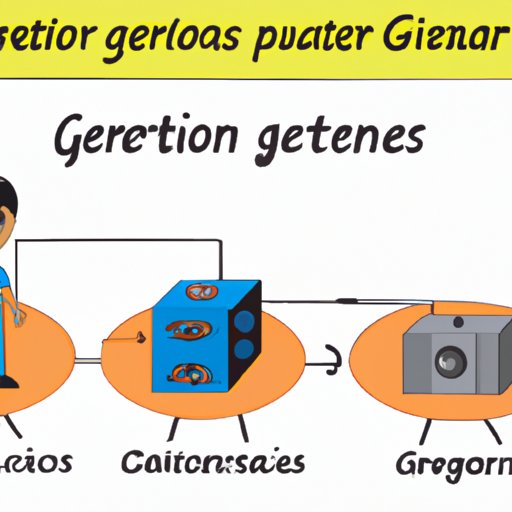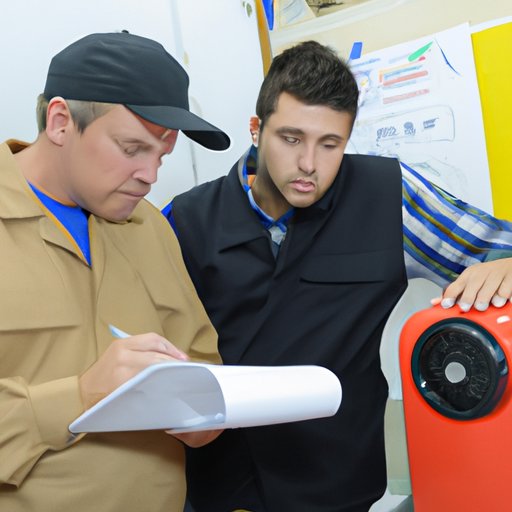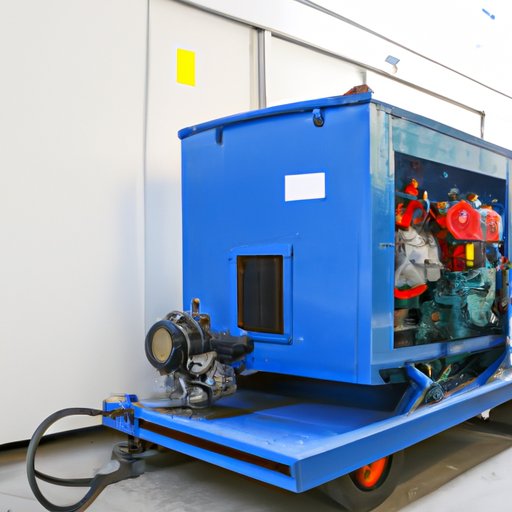Introduction
Generators are devices that convert mechanical or chemical energy into electrical energy. They are powered by combustible fuels such as gasoline, diesel, propane, and natural gas, and are used to provide electricity in places where there is no access to the power grid. Generators can be used for a variety of purposes, from providing backup power during outages to powering industrial equipment. While generators have many advantages, they also have some potential drawbacks, so it’s important to understand how they work and what makes them different from other power sources before making a decision on whether or not to purchase one.

Explaining the Basics of Generator Operation
Generators produce power by converting mechanical energy into electrical energy. This is done through the use of an engine and an alternator. The engine is powered by a combustible fuel such as gasoline, diesel, propane, or natural gas. As the engine runs, it turns the alternator, which produces alternating current (AC) electricity. The AC electricity is then converted into direct current (DC) electricity by a rectifier, which is then sent to the outlets for use.
The type of fuel used by a generator depends on the size and type of generator. Smaller portable generators typically use gasoline, while larger stationary generators may use diesel, propane, or natural gas. The type of fuel used will affect the cost, efficiency, and environmental impact of the generator.
Generators can also produce either AC or DC electricity. AC generators are more common, as they are easier to regulate and control than DC generators. DC generators are generally used for specialized applications such as welding or powering certain types of motors.
Outlining the Parts of a Generator and How They Work Together
Generators consist of several basic components, including an engine, alternator, rectifier, voltage regulator, and battery charger. The engine is the main component of the generator and is responsible for producing the mechanical energy needed to turn the alternator. The alternator is the device that converts the mechanical energy into electrical energy. The rectifier then converts the AC electricity produced by the alternator into DC electricity. The voltage regulator regulates the voltage output of the generator, while the battery charger is used to charge any batteries that are connected to the generator.
These components all work together to produce electrical energy. When the engine is started, it turns the alternator, which produces AC electricity. The rectifier then converts this AC electricity into DC electricity, which is then regulated by the voltage regulator. The battery charger is then used to charge any batteries connected to the generator.

Demonstrating What Makes Generators Different from Other Power Sources
Generators offer several advantages over other power sources, including their portability, flexibility, and reliability. Generators are also relatively easy to operate and maintain, compared to other forms of power generation. However, there are also some potential drawbacks to using generators, such as higher fuel costs, noise pollution, and environmental impacts. It’s important to consider these factors when deciding whether or not to use a generator for your power needs.
When choosing a generator, it’s important to consider the size, type, and fuel requirement of the generator. Additionally, you should also consider the cost of the generator and its maintenance requirements. Depending on your specific needs, you may find that a generator is the best option for providing power, or you may decide that another form of power generation is better suited to your needs.

Examining the Pros and Cons of Generators
Generators offer several advantages, including portability, flexibility, and reliability. They are also relatively easy to operate and maintain, compared to other power sources. Additionally, generators are often less expensive than other forms of power generation. On the other hand, generators can be noisy and may produce air pollution, depending on the type of fuel used.
It’s also important to consider the potential drawbacks of using generators. Generators require regular maintenance and can be expensive to run, depending on the type of fuel used. Additionally, generators are not always as efficient as other forms of power generation, and may not be suitable for certain applications. Finally, generators can be dangerous if not used properly, so it’s important to take safety precautions when operating a generator.
Describing the Different Types of Generators Available
There are several different types of generators available, including portable generators, standby generators, and industrial generators. Portable generators are small and lightweight, making them ideal for camping trips or other activities where power is needed but not readily available. Standby generators are larger and more powerful, and are designed to provide backup power in case of a power outage. Industrial generators are the most powerful and are designed for large-scale applications such as construction sites or factories.

Comparing Generators to Alternative Energy Sources
Generators are often seen as an alternative to other forms of energy production, such as solar power, wind power, and hydroelectric power. Solar power is generated using photovoltaic cells, which convert sunlight into electricity. Wind power is generated by capturing the energy of the wind with turbines. Hydroelectric power is generated by harnessing the energy of moving water. All of these forms of energy production have their own advantages and disadvantages, and it’s important to consider all of them when deciding which form of energy production is best for your needs.
Exploring Ways to Maintain and Maximize Efficiency with Generators
To ensure that your generator is working at maximum efficiency, it’s important to perform regular maintenance. This includes changing the oil and filters, checking the spark plugs, and replacing worn parts. Additionally, it’s important to properly place your generator in order to maximize efficiency and minimize noise pollution. Finally, it’s important to use load balancing when using multiple generators to ensure that each generator is operating at its optimal level.
Conclusion
Generators are a reliable source of power and can be used in a variety of applications. They offer several advantages, such as portability, flexibility, and reliability, but they also have some potential drawbacks. It’s important to understand how generators work, the types of fuel used, and the components that make up a generator before making a decision on whether or not to purchase one. Additionally, it’s important to consider the potential benefits and drawbacks of using generators compared to other forms of power generation. With proper maintenance and usage, generators can be a reliable and efficient source of power.
(Note: Is this article not meeting your expectations? Do you have knowledge or insights to share? Unlock new opportunities and expand your reach by joining our authors team. Click Registration to join us and share your expertise with our readers.)
